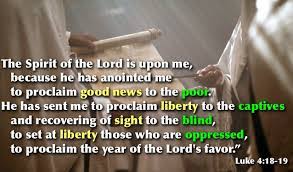 | St Alban’s Episcopal Church Bolivar, Missouri January 28, 2022 Sunday’s readings: Jeremiah 1:4-10Luke 4:21-30 |
Now the word of the Lord came to me saying, “Before I formed you in the womb I knew you, and before you were born I consecrated you I appointed you a prophet to the nations. “Then I said, “Ah, Lord God! Truly I do not know how to speak, for I am only a boy.” But the Lord said to me, “Do not say, ‘I am only a boy,’; for you shall go to all to whom I send you, and you shall speak whatever I command you. Do not be afraid of them, for I am with you to deliver you, says the Lord. “Then the Lord put out his hand and touched my mouth, and the Lord said to me, “Now I have put my words in your mouth. See, today I appoint you over nations and over kingdoms, to pluck up and to pull down, to destroy and to overthrow, to build and to plant.”  Next time someone uses Jeremiah 1 to talk about how God calls us all – you might point out what Jeremiah’s unique prophetic call actually looked like: imprisonment, rejection, forced exile, false accusations – and see if they are really up for that. Jeremiah understands that he was chosen before his birth, and protected for the particular ministry he was given. But Jeremiah isn’t any happier with this gift than Moses was. And he tries to get out of it as Moses did: “I do not know how to speak.” He finally gives in. But Jeremiah also argues with God all the way through the rest of his life; he hates his job, and he even accuses God of “overpowering” him and forcing him to do His will. What he has to offer is an unwelcome and difficult message to his own people as well as to other nations. It will anger both the religious and political leaders as he confronts their entrenched and unjust societal norms. He portrays God as outraged by the kings, opposed to their self-indulgence and ostentation. This, of course, is ALWAYS the message of true prophets, as Jesus himself observes..  They synagogue in his hometown loved what Jesus had to say – at first. But as soon as they acted like they were entitled to miracles – rather than repentance – as if they should be the ones being “favored,” he stops them cold by reminding them of Elijah and Elisha – who did exactly what Jesus proclaims. But they did those miracles for foreigners, outsiders, who had no “claim” on God’s mercy but yet received it. And then the people’s response is to attempt to kill the messenger. This is, of course an extraordinarily contemporary message to God’s people in every generation. You will remember the prophetic words of the Rev Dr Martin Luther King – and so many others. And the trajectory of Jesus’ life. |

No responses yet